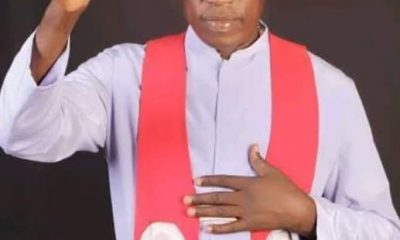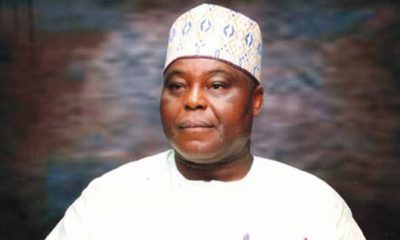News
Opinion: Seyi Tinubu and the Love that Money Buys

By Abimbola Adelakun
By now, you have probably seen Seyi, the president’s son, at presidential meetings and functions where he, ideally, has no business. Remember, his father had to ban him from attending the weekly meetings of the Federal Executive Council, saying his access was “undue.” Undeterred, Seyi still showed up at the swearing-in ceremony of Justice Kudirat Kekere-Ekun as the Chief Justice of Nigeria. While his meddlesomeness has spurred some people to wonder if he has any other job besides being “daddy’s boy,” I have also wondered if he is just another self-unaware member of the Nigerian political class or is intentionally shaming his father.
Since his father got into office last year, Seyi has been doing public charity and ensuring he is seen doing so. Through his associates, he has given out relief items to people involved in a fire disaster in Nasarawa, gifted “palliatives” in Abuja, and sponsored some medical outreaches. In September, he donated N500m to victims of the Maiduguri flood. Seyi flew to Borno with a team of associate-sympathizers and was received by the state governor, Babagana Zulum. If Nigeria were not a place where even governors have been thoroughly emasculated into subservience, why would the governor set aside his official duties to host the president’s son? The president’s son is unrecognized by the constitution, and Seyi has no business interloping in official affairs.
Anyway, one of the striking parts about Seyi’s visit was not just the money he donated but the speech he gave. It was more thoughtful than the perfunctory one his father had delivered a week earlier when he too visited. Seyi also assured the victims of the flood that he—or his foundation―would be further intervening until they were back on their feet. But in what capacity would he be making this “further” intervention when, as the son of the president, he is neither a private individual nor possesses an official designation? He cannot claim to be a neutral observer who is merely concerned about people’s welfare because the basis on which he does what he does is his filial connection to the president. If he were not the president’s son, Zulum would not have rolled out the carpet to receive him in Borno. Yet, it was not his place to intervene in the Borno crisis. He has no business doing any of these things.
Just last week, Seyi announced that he would once again be saving Nigerians from a bad fate. A foundation he had founded said they would be alleviating the financial hardship Nigerians face while procuring prescribed medication by creating a drug bank that would serve over 10,000 indigent people in 60 hospitals around the country. Just like in Borno, Seyi’s speech, read by a representative, as the scheme launched was compassionate, better than the yawnfest his father reads on national television on the few days in a year he deigns to talk to people. Seyi’s speechwriter managed to throw in all the right phrases about the burden people face accessing life-saving medications. This drug bank, they say, is more than medicine but a “commitment to dignity, to equality, and to the fundamental human right to healthcare.”
Now, that is where the problem lies. It is not enough that the president’s son is taking up initiatives that should be carried out by designated government officials—and in the process spending a humongous amount of money no one knows where he gets it from—but he also subtly disrespects his father in the process. Because there is no way Seyi is talking about the necessity of his drug bank initiative and the “added weight of crushing financial hardship” people confront without indicting his father whose poorly wrought policies have so impoverished the populace that they now need the son’s charity.
A couple of days ago, Seyi also shared bags of rice branded with his visage to some poor women who were then pressed to pray for him for his generosity. You know that it was not those women’s prayers he needed; he just wanted to be seen as a benefactor. Look, if Seyi truly cared about those women, he would not give them rice. He would face his father and tell him to take his paws off their destiny.
One can, of course, argue that Seyi has a prior record of charity, but still doing it especially while his father’s administration is falling apart gives the impression that Seyi is trying too hard to be seen as the successful son of a failing man.
Seyi’s adult life has been tied to his father; everything he has ever achieved professionally was muscled for him through daddy’s totalitarian politics. Given how that same father is diminishing in value and therefore unlikely to hand over valuable political capital to his children as their inheritance, the hope of a dynasty on which politicians’ scions calibrate their future political ambitions is tanking. The son seems to have read the handwriting scribbled everywhere and wants to cut loose to build something apart from daddy. That is why he jumps from Maiduguri to Ibadan, trying to prove he has the compassion—even if not the capacity—his father sorely lacks.
Seyi’s struggle to win the hearts of the folk even as his father is losing them is not exactly a political patricide—it is doubtable if he is even gutsy enough to even dream of attempting that—but impressioneering a better image for himself and generating some social capital, that while can be related to Tinubu, is still not Tinubu. While the savviness is consistent with the character of high-stakes politics, Seyi is not doing anything excitingly different from the jeun sókè jeun sápò political calculations that made his father. One would think a man that young would depart from his father’s politics of orifice that swings back and forth between mouths and agbada pockets, to try something refreshingly new, but Seyi seems wedded to the old and, frankly, boring methods of giving people a mere 0.000000001 percent of what has been stolen from them.
His aspirations might be legitimate enough, but there are challenges ahead. There is a good reason dynasties hardly hold up in this part of the world. First is the issue of the competitors. Far too many people want what Seyi’s father has, but since they know they will not get it, they have settled for subordinate positions. While they may have submitted to Tinubu’s powerful grip after serially losing in the power game against him, they are somewhere seething, raging, and biding their time. When the time comes to bid for the throne, they will easily oust daddy’s boy. They are far more desperate and more practiced in the Game of Thrones, and he is no match for them. Besides, our people too get tired of serving successive generations. When that time comes, they will remind him that they cannot serve his father and still serve him. Whatever they owe their family patriarch must be considered paid off at some point.
Second is that money, the basis on which the public relates to the Tinubus is the flimsiest of all the grounds on which one can build a lasting relationship. Love that flows with the tide of money will ebb when it ebbs. The Tinubu family is one that nobody will love if not for their money. That, of course, includes Mrs Tinubu who needed to hand out huge sums of money just to stimulate interest in her farming and fabric projects. Even now that she has had a Nebuchadnezzar-sized statue carved for her, nobody who has not been pre-paid will bow before her graven image. So, yes, Seyi too can try his desperate best but the love he will get will come with a receipt.
News
Adeboye: God said my firstborn would die if I leave RCCG

Pastor Enoch Adeboye, the General Overseer of the Redeemed Christian Church of God (RCCG),, has said that God once gave him a stern warning never to leave the denomination, or face the death of his firstborn.
He shared this revelation during the June edition of the Holy Ghost Service, titled “Destined for Greatness (Part 2),” held in the early hours of Saturday at the Redemption City of God in Ogun State.
While speaking on the theme of divine direction and spiritual steadfastness, Adeboye referred to a message earlier delivered by his son, Pastor Leke Adeboye. He expressed concern over a growing trend among young Christians who frequently switch churches, often introducing themselves as first-time visitors in every new place they attend.
Recalling his own journey of faith, Adeboye said that when he became born again, several thriving ministries were popular and attractive at the time. Despite the appeal, he said God specifically instructed him to remain in RCCG.
“When I got born again, there were three major ministries that were making waves, and they were very good. There were different temptations to go from one to another,” he said. “But God said to me, ‘Son, I brought you here. This is where you will stay. The day you leave this denomination, your firstborn will die.’”
He noted that at the time, RCCG was relatively obscure, with its headquarters located in a modest building in Ebute-Metta, Lagos. Even though he was a university lecturer, he said God commanded him to serve under his spiritual mentor, who had no formal education.
“I was a lecturer at the university. My father in the Lord didn’t go to secondary school, not even primary,” he said. “But God said this is where you will stay.”
Pastor Adeboye urged young believers to seek divine direction and remain where God places them, rather than chasing trends or personal preferences.
“Discover where God wants you to stay, and stay there,” he advised.
He also clarified that his message was not intended to suggest that RCCG is superior to other Christian denominations.
“I am not saying we are better than any other denomination,” the cleric said.
News
Deadly flooding: Zulum appeals to FG for speedy completion of Alau Dan to advert disaster

Borno State Governor, Babagana Zulum, has appealed to the Federal Government to fast-track the rehabilitation and expansion of the Alau Dam.
He made the appeal when the Shehu of Borno paid the traditional Sallah homage to the governor at Government House, Maiduguri, saying such was necessary to avert another Borno flooding disaster.
Zulum, who expressed concern over the slow pace of work on the project, warned that at the dawn of this year’s rainy season, urgent action was needed.
According to the governor, fast-tracking the project would prevent a repeat of the 2024 flood disaster which devastated Maiduguri and surrounding local government areas.
“After the groundbreaking ceremony for the reconstruction and expansion of the dam, which we all attended, the truth is that the work is not progressing as expected.
“The last time I visited the president, I informed him about the true state of the project. I assure you I will not relent. I will continue to follow up, and I have also notified the Vice President.
“In the meantime, the Secretary to the State Government has constituted a committee to provide immediate intervention at the dam,” Zulum said.
The Federal Government had earlier this year approved N80 billion for the reconstruction and expansion of the dam.
The intervention was aimed at mitigating a repeat of the dam’s collapse incident, which culminated in the severe flooding and damages that ensued.
A groundbreaking ceremony was held in March to mark the official commencement of the project.
Zulum also pledged to connect all local government headquarters in the state to the national electricity grid before the end of his administration.
News
Gwogwogwongwo singer Mike Ejeagha dies at 95

Highlife music icon Mike Ejeagha has passed on at the age of 95. He was known for incorporating proverbs into his music and is the original owner of the now popular song-dance gwogwogwongwo.
Ejeagha died on Friday night at about 8 p.m. at the 32 Garrison Hospital in Enugu after a protracted illness.
His passing was confirmed by his eldest son, Emma Ejeagha.
Born on April 4, 1930, Mike Ejeagha launched his music career in really in life and significantly influenced the evolution of music in the Igbo language for over six decades.
He gained widespread fame after he was invited by the Nigerian Television Authority (NTA) as a guest presenter for an Igbo program, ‘Akuko N Egwu’, in 1972.
He is survived by his wife, children, and grandchildren.
-

 News2 years ago
News2 years agoBreaking: Tinubu’s authentic ministerial nominees
-

 News2 years ago
News2 years ago“Anytime we want to kill terrorists, President would ask us to take permission from France but they were killing our soldiers-” Niger Republic coup leader
-

 News2 years ago
News2 years ago“I’m leaving the Catholic church because Bishop Onah is oppressing me,” says Okunerere
-

 News3 months ago
News3 months agoSenate to speed up conclusion of Nigeria Forest Security Service Bill
-

 News2 years ago
News2 years agoDokpesi and the Gazebo Mystique
-

 News2 years ago
News2 years agoRadio Nigeria’s veteran broadcaster Kelvin Ugwu dies three months after retirement from service
-

 News1 year ago
News1 year agoPersons against Allagoa’s reforms behind protests at NSITF
-

 News2 years ago
News2 years agoTsunami: Tinubu orders dissolution of managements, boards of MDAs, to sack all Buhari’s political appointees

